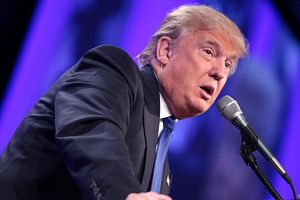Matt Peterson, in a recent article at the Atlantic, makes a case for the ‘Five World Leaders Who Might Benefit From a Trump Presidency.’ Indian Prime Minister Narendra Modi comes in at the top of his list. Peterson points out Trump’s history of speaking out in favor of Modi, his positive investment prospectus for India, and the synergies between Trump’s heavy economic skepticism of China and New Delhi’s own strategic rivalry with Beijing. Peterson also responsibly highlights the ugly underbelly of this hypothetical bilateral, noting that the Hindu nationalists in India’s Bharatiya Janata Party might not balk all that much at Trump’s brazen anti-Muslim language.
I found Peterson’s case for why India would benefit from a Trump presidency provocative. In all seriousness, however, I do suspect that he’s overlooked a few important ways in which Trump could set back U.S.-India ties. Moreover, recent reports that Indian diplomats have been among the foreign emissaries in the United States privately voicing concerns about Trump to their U.S. counterparts suggest that Indians themselves might not share Peterson’s optimism.
Domestically, one of the big obstacles to Indian support for Trump will come down to his position on H-1B visas for skilled immigrant workers. Indian citizens and companies benefit disproportionately from this program. In 2013, U.S. government data showed that Indian citizens received nearly two-thirds of all H-1B visas, abetted in part by Indian outsourcing firms. Though Trump has vacillated on his H-1B position, as he has on so many of his other positions, his website currently cites the program as a major point of grievance with existing U.S. immigration provisions.
An H-1B crackdown could potentially affect India’s economy as well. India is the top remittance receiving country, accounting for just over 12 percent of world remittances in 2007. In 2012, remittances to India stood at $70.39 billion and represented 4 percent of the country’s GDP. Non-resident Indians (NRIs) in the United States sent nearly $11 billion in remittances in 2012, representing the second greatest source of remittances after the United Arab Emirates. India’s current political leadership has shown that it is attuned to the interests of the vast Indian diaspora living abroad, particularly in the United States. U.S. immigration policies have important economic effects for India and New Delhi will take note of what Trump is promising.
Peterson points out that Trump, unlike most U.S. presidents, would probably actually deliver on his skepticism about Pakistan’s value as a U.S. ally. Indeed, it’s difficult to imagine a President Trump authorizing something like the recent sale of eight F-16s to Islamabad; he’d probably say it was a “terrible deal.” Even if Trump were to turn off the faucet of U.S. aid and assistance to Pakistan though, you get the whole Trump package, with all its possible retrenchment across Asia. I suspect, however, that everything else in this article about Indian reservations regarding Trump would disappear if the great deal-maker could somehow convince Islamabad to give up its nukes and focus on internal governance.
The second-order effects of the United States cutting off its alliances with Japan, South Korea, and the Philippines, and pulling back from its networked multilateralism in Asia would have immensely negative consequences for India. Though Pakistan’s already inferior conventional military capabilities would continue to lag behind, New Delhi would find that without active leadership, China’s room for maneuver is suddenly much greater. In the Indian Ocean, with a disinterested Trump-led U.S. Navy, the Indian Navy would be overstretched and overburdened. The security of Indian Ocean sea lanes, vital for India as a net importer of energy, would be at threat of interdiction and looting by pirates.
The anti-Muslim synergy between Trump and India’s ruling party is also somewhat of a canard. While communal tensions between India’s Hindu and Muslim communities has acquired a new salience in the country’s politics since Modi’s 2014 ascent to the prime minister’s office, there is little evidence to suggest that Hindu nationalist disinterest in secular politics has affected India’s foreign relations. While Modi has been rightly criticized for not doing enough to rein in members of his party who have stoked inter-religious tensions, he hasn’t actively taken his Hindu nationalist views abroad. In this sense, Trump’s Islamophobia would have a net zero effect on the U.S.-India bilateral.
Finally, Trump’s flattery for India, while no doubt appreciated by Indians, should amount to little should he become president. World leaders flatter each other’s countries as a matter of habit. Trump has said accurately that India “is doing great,” but that’ll be true regardless of whether he becomes president. Trump’s compliments for Modi could help create a good working relationship between the two men (Modi’s 56-inch chest is no doubt impressive to Trump’s sensibilities), but the Indian prime minister doesn’t seem to have much trouble getting along with world leaders and probably will get along just fine with any of Trump’s competitors for the presidency.
Notwithstanding the massive second-order effects of U.S. retrenchment from Asia, there’s plenty about Trump that won’t be to India’s liking. On balance, New Delhi, like the rest of Asia, will be better off dealing with one of Trump’s competitors come January 2017.
































